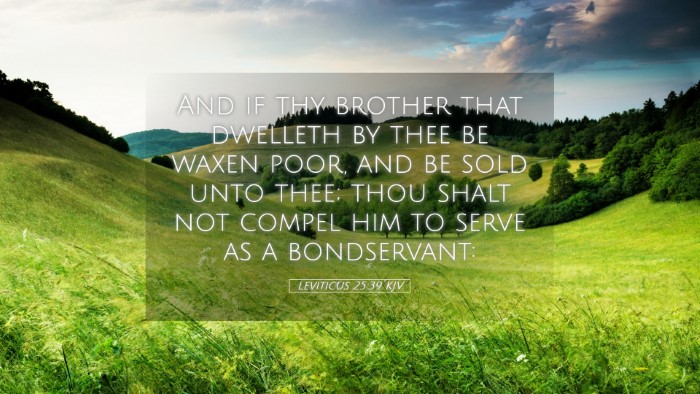Commentary on Leviticus 25:39
Verse Context: Leviticus 25:39 states, “And if your brother becomes poor beside you and sells himself to you, you shall not make him serve as a slave.” This verse is situated within the broader context of the laws governing the Sabbath and Jubilee years, where the fate of the Israelites in matters of servitude and economic transactions is discussed.
Summary of the Verse
This passage underscores the importance of ethical treatment within the community of Israel. It emphasizes the dignity of the individual and introduces the concept of humane treatment of those who fall into economic hardship. It speaks against the idea of treating one's fellow human as mere property, and it brings attention to the ideal of community and mutual support among God's people.
Insights from Commentators
Multiple commentators provide rich insights on this passage, emphasizing both its historical context and its enduring ethical implications.
-
Matthew Henry:
Matthew Henry remarks on the underlying principle of charity and brotherhood that this law enshrines. He notes that while the individual may find themselves in a position of economic vulnerability, the community is called to respond with compassion rather than exploitation.
Henry emphasizes that the law was intended to promote a culture of mercy, stating, “It is the duty of those who are blessed with prosperity to be ready to help those who are in need. This is a vital principle that highlights the covenant relationship God's people are supposed to maintain with one another.”
-
Albert Barnes:
Albert Barnes provides detailed insights into the nature of servitude outlined in this verse. He points out that the Hebrew term for “servant” (עֶבֶד, 'ebed) does not carry the same connotation as modern slavery contexts but refers more to a bond-servant or indentured servant, suggesting that the arrangement should be one of mutual respect and obligation.
Barnes elaborates that such a practice allowed individuals going through hard times to be provided for while also maintaining their dignity. He succinctly articulates the ethical necessity, stating, “The servitude should not bind them indefinitely but should have provisions for release, illustrating God's redemptive heart in economic distress.”
-
Adam Clarke:
Adam Clarke expands on the social implications of this verse, suggesting that it promotes an ideal community where need is met with generosity. He elaborates on the importance of the "brotherly bond," asserting that the notion of “brother” implies a familial obligation to care for one another within the Israelite community.
Clarke notes that this instruction not only sought to legislate compassionate action but also served to establish a standard that was counter-cultural to the surrounding nations at that time. He states, “The Lord's law provides that servitude should not be a degradation but a means of support and restoration, reflecting God's will for society.”
Theological Reflections
The verse invites deeper theological reflection about God's heart for justice and mercy. It can be interpreted not only within the historical context of Israel but as relevant for contemporary discussions about social ethics, economic justice, and the treatment of the marginalized within society.
-
Community Responsibility:
This passage serves as a reminder of the communal nature of God's covenant. When one member suffers, the entire community is called to respond in love and support. This challenges modern notions of individualism and self-sufficiency.
-
Dignity in Service:
There is a theological emphasis on the inherent dignity of every individual made in the image of God. The approach advocated in this verse aligns with God's directive for His people to foster an environment of dignity, respect, and care.
-
Parallels in New Testament:
This concept of compassion and ethical treatment re-emerges in the New Testament where themes of love, service to others, and caring for the poor and needy are central to Jesus' teachings and the Apostle Paul's exhortations to the church.
Application for Today
This verse has significant implications for modern believers and church leaders as it challenges the faithful to enact biblical principles of justice, mercy, and community care in their respective contexts.
-
Support for the Economically Disadvantaged:
Churches today can take the initiative by offering programs that support those struggling financially, thus embodying the principles established in the Law of Moses.
-
Advocacy for Justice:
Believers are encouraged to engage in advocacy for social justice, taking the teachings from Leviticus 25:39 to heart by promoting systems that protect the dignity and welfare of individuals facing economic hardship.
-
Cultivating a Community of Care:
In every congregation, there should be a focus on building a culture of care that mirrors the divine compassion mentioned in the law, ensuring that no member feels isolated during times of need.
Conclusion
Leviticus 25:39 is a profound reminder of the ethical obligations individuals and communities have to care for one another, rooted in the love and justice of God. The insights from respected theologians guide contemporary believers to embody these principles in tangible ways, maintaining the heartbeat of God’s law within our lives today.


